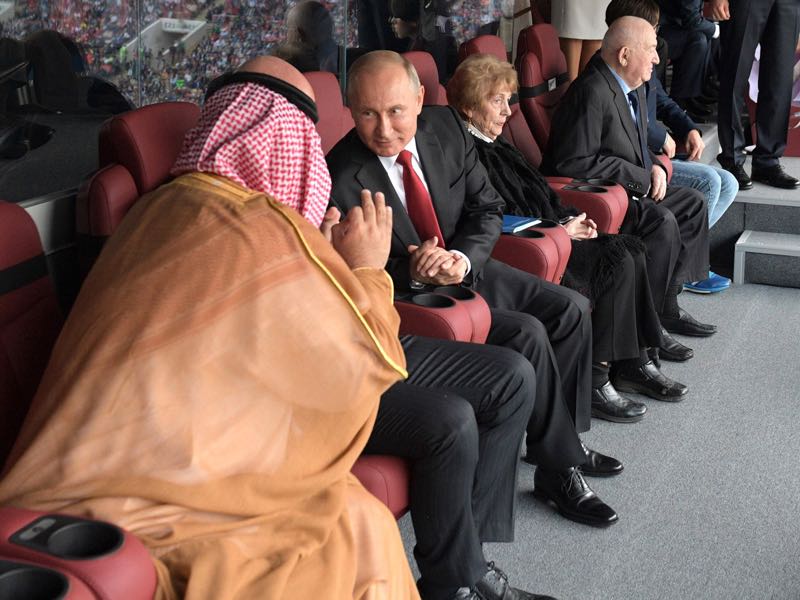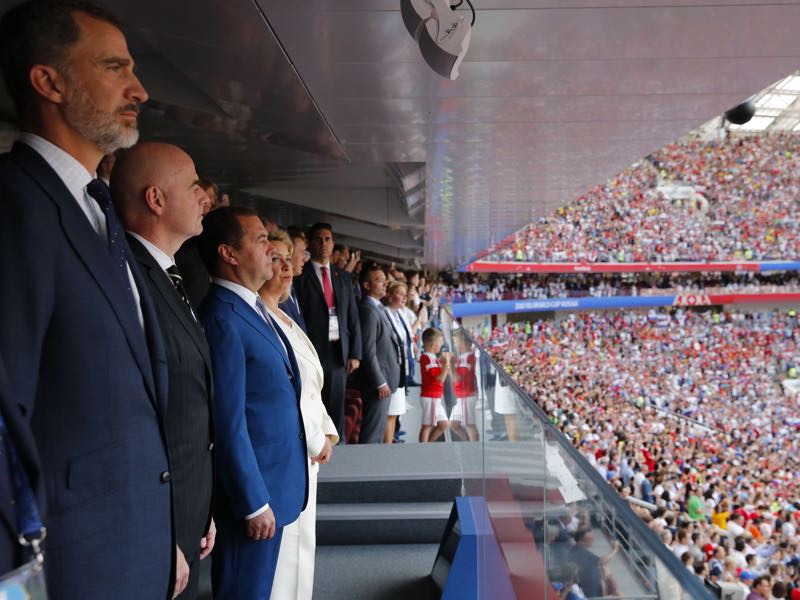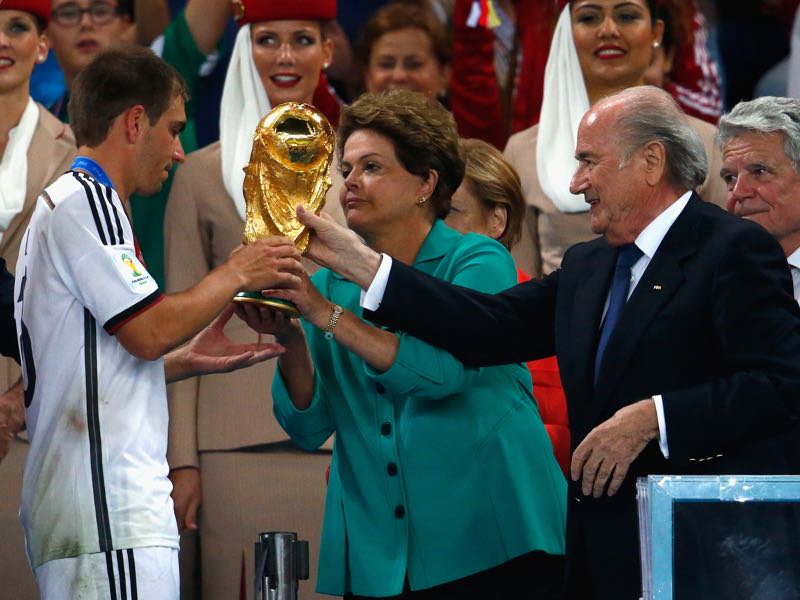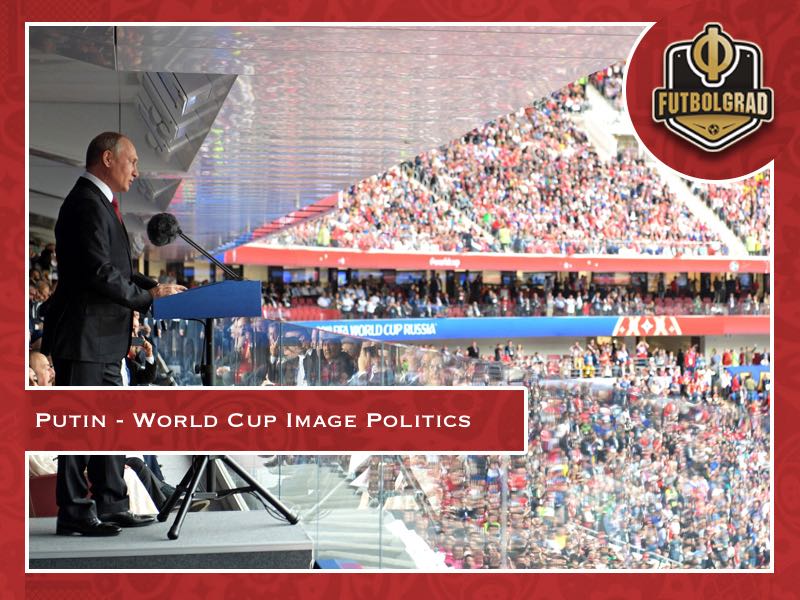Manuel Veth reporting from Moscow –
Artem Dzyuba had just scored the equaliser against Spain in the 40th minute of the quarterfinal clash between the Russia and Spain when the camera cut into the VIP-Box. Sitting next to FIFA President Gianni Infantino was the Prime Minister of Russia Dmitry Medvedev and not President Vladimir Putin.
Later after Russia had surprisingly defeated Spain to advance to the next round, images were distributed on the Sbornaya‘s social media accounts showing Medvedev congratulating the players in the dressing room. Also present was the former Minister of Sport Vitaly Mutko – Mutko was moved from the position due to international pressure due to his supposed involvement in Russia’s Olympic doping scheme.
Mutko’s presence certainly raised some eyebrows among international observers. Mutko is controversial for his supposed role in Russia’s doping scheme and is not supposed to be involved in sporting matters anymore, but even in his new position, he was always going to take an interest in this team and the tournament.
Far more interesting was the presence of Prime Minister Medvedev. The number two behind Vladimir Putin represented the Russian government in what was perhaps the most important match of the Sbornaya since the breakup of the Soviet Union – yet Putin was not there, which in itself says something interesting about the government’s expectations in the squad.
Image is a central point in Putin’s Russia
The positive image of President Putin is a central point in the Kremlin’s policy. Putin in many ways is the benevolent leader of this country, who guided Russia out of the shadows of the Boris Yeltsin years towards stability and prosperity. Putin also brought Russia back onto the world stage by getting involved in Ukraine and Syria.
Involvements in both those conflicts have led to strict sanctions against the Russian economy and the political elite of the country. Several oligarchs, for example, were put on a US Treasury List “for worldwide malign activity”, in January. The Treasury Department followed that list up with sanctions on seven Russian oligarchs and 12 entities that they owned as well as 17 government officials in April.

Saudi Arabia’s Crown Prince Mohammed Bin Salman Al Saud and Russia’s President Vladimir Putin during the opening ceremony prior to the 2018 FIFA World Cup Russia Group A match between Russia and Saudi Arabia at Luzhniki Stadium on June 14, 2018 in Moscow, Russia. (Photo by Pool/Getty Images)
That list was further expanded on June 11, just days before the World Cup hit off, in response to a supposed Russian cyber-attack. Just a few days later, at the start of the World Cup on June 14, Putin was shown sitting in his VIP-Box at the Luzhniki celebrating the opening of the World Cup with King Salman.
Unexpectedly Russia dominated this match walking away with a 5-0 victory. After every goal, the camera would show the VIP-Box where Putin and Mohammed bin Salman were joking, laughing and shaking hands. The two had good reasons to be jovial after all they had just signed a lucrative weapons deal and had constructive talks about oil production – an area where the two countries want to cooperate more closely in the future.
The benevolent leader
The images shown to the world and the Russian audience, therefore, had a purpose. Here was Putin meeting with another world leader, amid talks by many governments that they would not visit Russia in the follow up of the Salisbury attack, enjoying a convincing victory by the Russian national team.
Given Saudi Arabia’s relative lack of strength and the presence of King Salman, Putin could only win with the images that were sent to the audience both in Russia and abroad. He was then, of course, further aided by the fact that the Sbornaya dazzled against Saudi Arabia as even the biggest optimists did not expect a 5-0 victory.
What does this then say about the game against Spain? With Medvedev present, the government put enough importance on the match to send a high ranking official to be present. At the same time, there was a real chance that Russia could not only go out of the tournament but experience a crushing defeat.

pain’s King Felipe VI, FIFA President Gianni Infantino, Russian Prime Minister Dmitry Medvedev and his wife Svetlana Medvedeva attend the 2018 FIFA World Cup round of 16 match between Russia and Spain in Moscow on July 1, 2018. (Photo by Dmitry Astakhov / Sputnik / AFP)
A defeat, however, would have also reflected on Putin’s government. Image is essential in Putin’s Russia. When Russia was awarded the tournament, Putin was reluctant to be present at the actual awarding ceremony in Switzerland.
Instead, the President of the Russian Federation arrived only after the country was awarded the World Cup – legend has it that the Putin was waiting in his private jet on a runway in Kaliningrad until the announcement was made. Putin needs to be associated with success to maintain his aura as a strong leader.
A “Germany moment” could hurt Putin
Therefore, a crushing defeat, a Germany moment as Brazil experienced it four years ago, could have potential long-term consequences for the government’s image, if Putin is closely associated with this World Cup. After all the Brazil experience, highlights what can happen to a government when the costs of a tournament emerge without the country having benefitted too much from it.
In Brazil four years ago the political elite very much was front and centre of the tournament. Dilma Rousseff was present at many of the matches, including Germany’s World Cup win over Argentina in which she handed the trophy to captain Philipp Lahm. Following the tournament, she won re-election, but criticisms over the costs of the competition would eventually bring her government down.

Philipp Lahm of Germany is presented with the World Cup trophy by Brazilian President Dilma Rousseff and FIFA President Joseph S. Blatter after defeating Argentina 1-0 in extra time during the 2014 FIFA World Cup Brazil Final match between Germany and Argentina at Maracana on July 13, 2014 in Rio de Janeiro, Brazil. (Photo by Clive Rose/Getty Images)
There are, of course, many comparisons between Russia and Brazil. But Putin’s government is more stable than Rousseff’s government ever was. But at the same time, Putin’s control is very much dependent on an image of strength and stability. A crushing 7-1 defeat to Spain, would not have fitted that image and as a result, the number two was sent to the match instead.
Now with Russia through to the next round, it will be interesting to see what will happen next. Croatia was among the countries to expel diplomats following the Salisbury attack and the Balkan conflict in the 1990s with neighbouring Serbia – a traditional brother nation of Russia – means that Putin would have little to gain regarding foreign policy to show up to the match.
Furthermore, like it was the case with the game against Spain, there is a good chance that this could be the end of the road for Russia. In terms, of image politics, there would be, therefore, very little to gain for the Russian President. But Putin has a residence on the Black Sea and perhaps he will grace the spectators with his presence in Sochi after all.
Manuel Veth is the owner and Editor in Chief of the Futbolgrad Network. He also works as a freelance journalist and among others works for the Bundesliga and Pro Soccer USA. He holds a Doctorate of Philosophy in History from King’s College London, and his thesis is titled: “Selling the People’s Game: Football’s transition from Communism to Capitalism in the Soviet Union and its Successor States,” which is available HERE. Originally from Munich, Manuel has lived in Amsterdam, Kyiv, Moscow, Tbilisi, London, and currently is located in Victoria BC, Canada. Follow Manuel on Twitter @ManuelVeth.




















COMMENTS
The civilized world would actually benefit if this two-bit murderous sociopath graced visitors at the Hague.